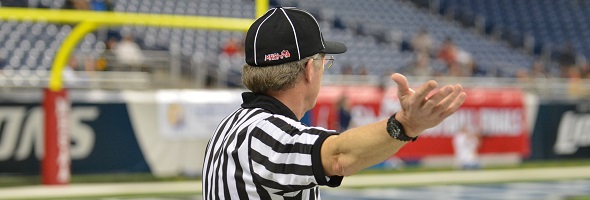
Be the Referee: Automatic 1st Downs
October 16, 2014
This week, MHSAA assistant director Mark Uyl explains the differences between high school and college and pro football when it comes to awarding automatic first downs.
"Be the Referee" is designed to help educate people on the rules of different sports, to help them better understand the art of officiating and to recruit officials. The segment can be heard on Mondays, Wednesdays and Fridays during the school year on The Drive With Jack Ebling on WVFN-AM, East Lansing.
Below is this week's segment - Automatic First Downs - Listen
Today we are going to talk about one of the biggest rule difference areas in high school football from those rules used in college and pro games and that deals with automatic first downs.
When watching that college game on Saturday or the pro game on Sunday, all of us know there are several defensive fouls that give the offense an automatic first down. However, under high school rules, the opposite is true most of the time.
The only high school fouls that result in an automatic first down for the offense are the roughing fouls - roughing the passer, the kicker, the holder and the long snapper. Fouls such as defensive pass interference or any other personal foul do not bring an automatic first down under high school rules.
Past editions
Oct. 8 - Officials & Injuries - Listen
Oct. 1 - Overtime - Listen
Sept. 25 - Field Goals - Listen
Sept. 18 - Tackle Box - Listen
Sept. 11 - Pass Interference - Listen
Aug. 25 - Targeting - Listen

Be the Referee: Football Rules Changes
September 5, 2019
This week, MHSAA Assistant Director Brent Rice discusses a pair of football rules changes made the enhance safety.
Be The Referee is a series of short messages designed to help educate people on the rules of different sports, to help them better understand the art of officiating, and to recruit officials.
Below is this week's segment - Football Safety Rules Changes - Listen
Among our football rules changes for this year are two which involve player safety.
The foul for tripping has been expanded to include a trip on the ball carrier. Intentionally tripping any player on the field – using the lower leg or foot to obstruct an opponent below the knees – will result in a 15-yard penalty.
And the definition of a horse-collar tackle has been expanded to include bringing down a runner backwards or sideways by grabbing the nameplate area on the back of the jersey – or inside the neck area of the jersey or shoulder plate. The penalty for a horse-collar tackle is 15 yards.
Past editions
Aug. 29: 40-Second Play Clock - Listen

